9B Unit2 Great people Revision2 课件(24张)
文档属性
| 名称 | 9B Unit2 Great people Revision2 课件(24张) | 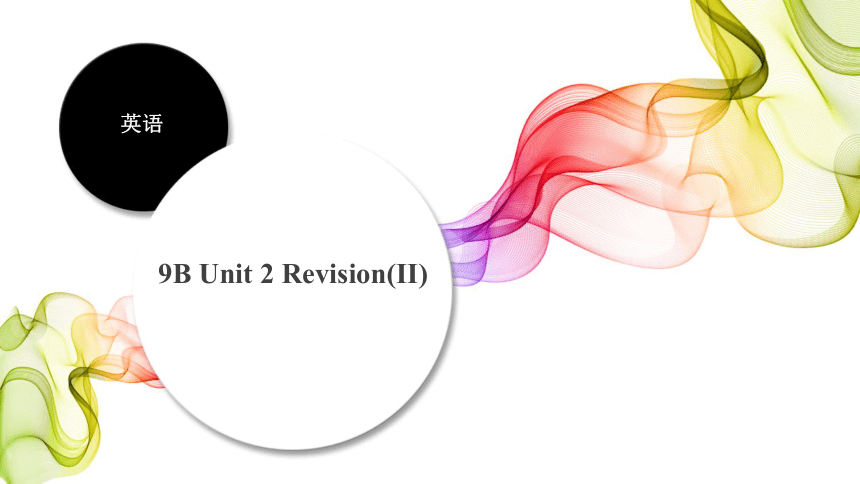 | |
| 格式 | zip | ||
| 文件大小 | 869.4KB | ||
| 资源类型 | 教案 | ||
| 版本资源 | 牛津译林版 | ||
| 科目 | 英语 | ||
| 更新时间 | 2020-05-20 07:58:06 | ||
图片预览


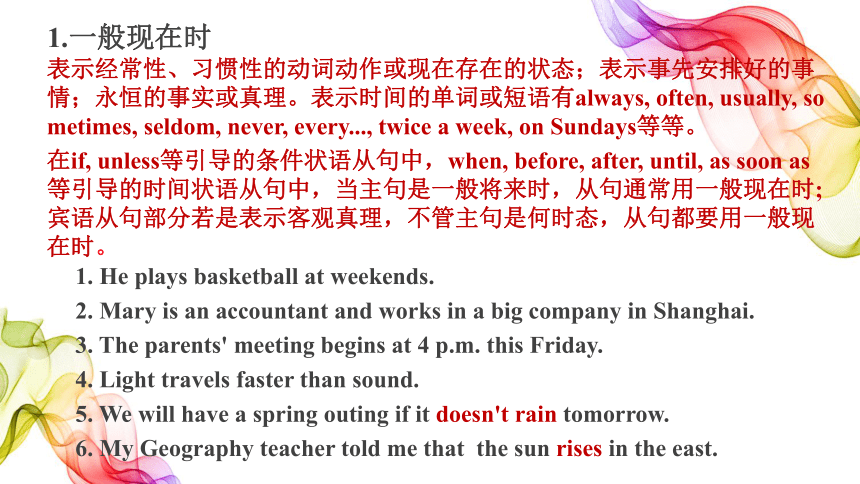
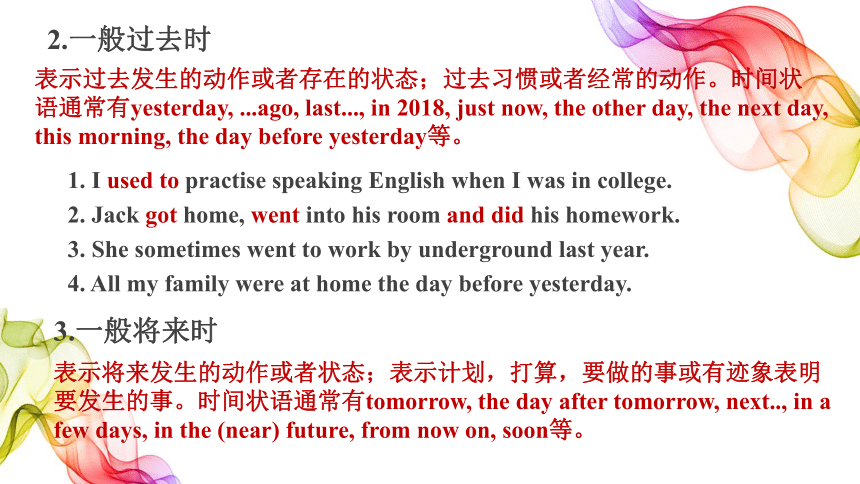
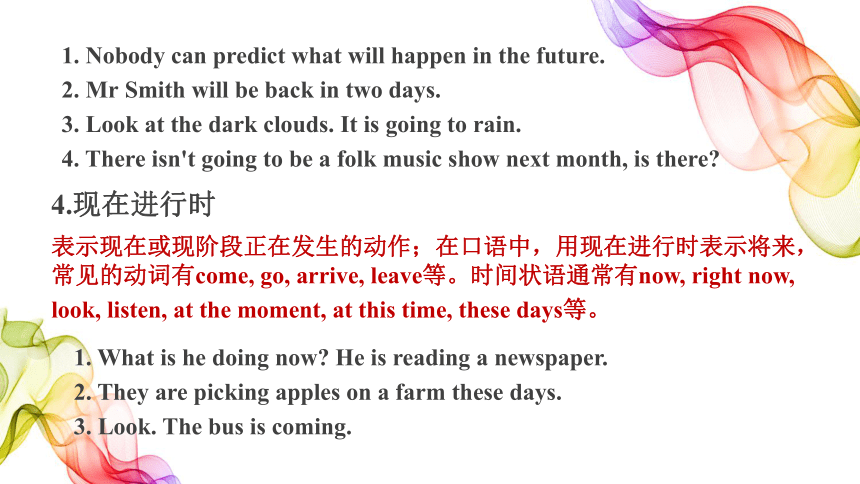
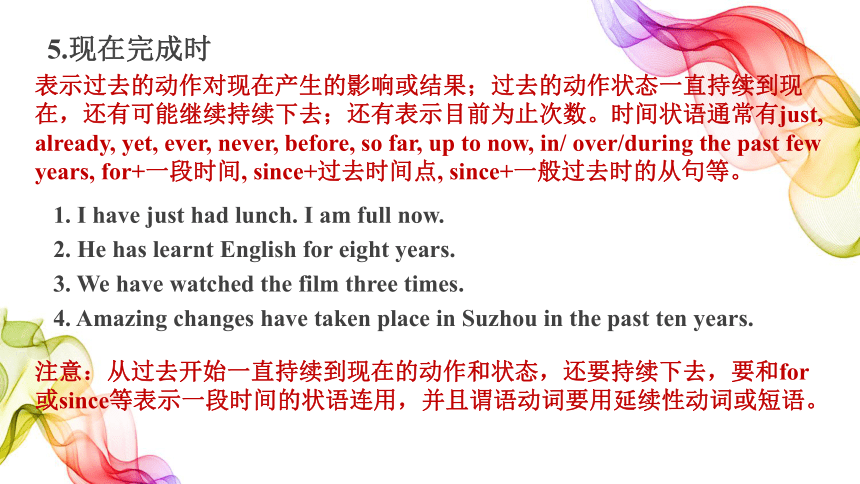
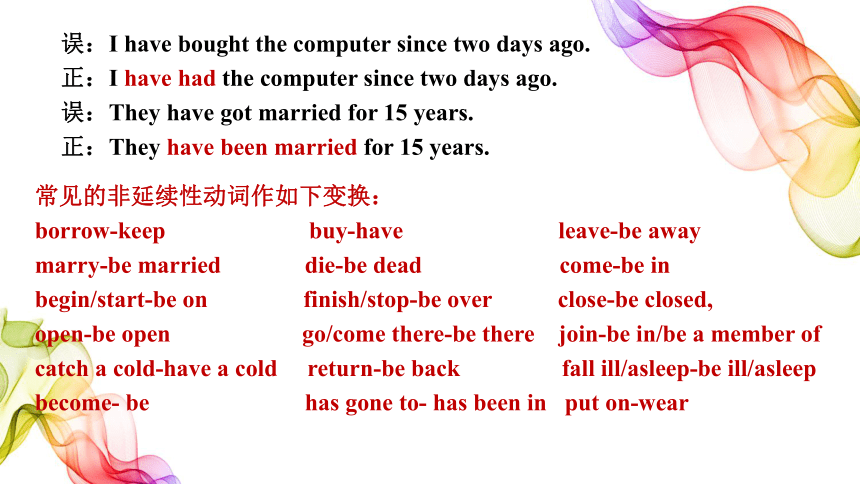
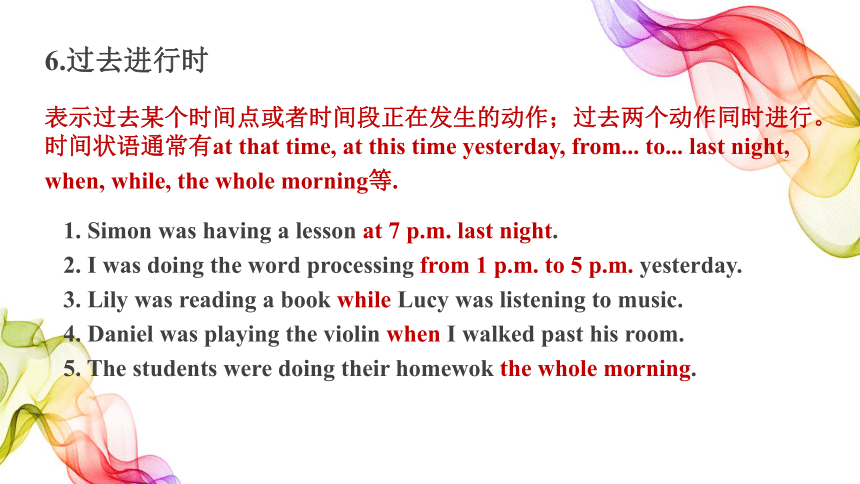
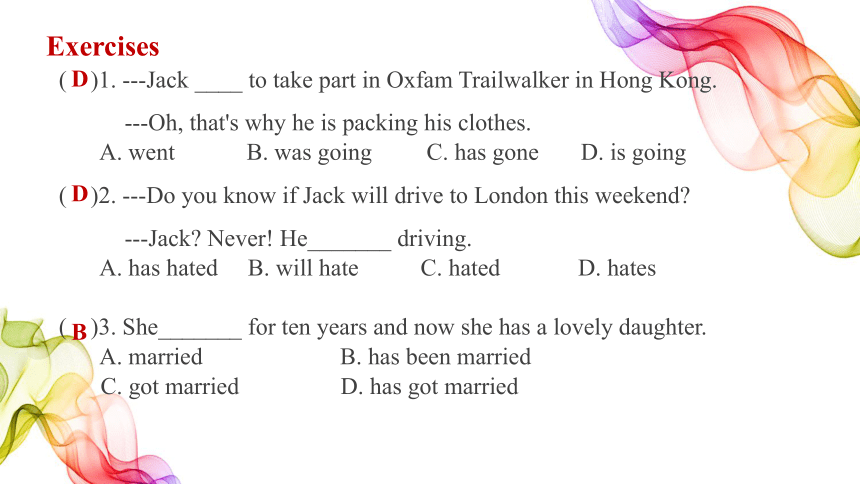
文档简介
(共24张PPT)
9B Unit 2 Revision(II)
英语
复习动词的时态
常见的六种时态
一般
现在时:谓语动词用动词原形或第三人称单数
过去时:谓语用动词的过去式
将来时:谓语用will/ be going to + 动词原形
现在
进行时:谓语用am/ is/ are + 动词的现在分词
完成时:谓语用have/ has + 动词的过去分词
过去
进行时:谓语用were/ was + 动词的现在分词
1.一般现在时
表示经常性、习惯性的动词动作或现在存在的状态;表示事先安排好的事情;永恒的事实或真理。表示时间的单词或短语有always, often, usually, sometimes, seldom, never, every..., twice a week, on Sundays等等。
在if, unless等引导的条件状语从句中,when, before, after, until, as soon as等引导的时间状语从句中,当主句是一般将来时,从句通常用一般现在时;宾语从句部分若是表示客观真理,不管主句是何时态,从句都要用一般现在时。
1. He plays basketball at weekends.
2. Mary is an accountant and works in a big company in Shanghai.
3. The parents' meeting begins at 4 p.m. this Friday.
4. Light travels faster than sound.
5. We will have a spring outing if it doesn't rain tomorrow.
6. My Geography teacher told me that the sun rises in the east.
表示过去发生的动作或者存在的状态;过去习惯或者经常的动作。时间状语通常有yesterday, ...ago, last..., in 2018, just now, the other day, the next day,this morning, the day before yesterday等。
1. I used to practise speaking English when I was in college.
2. Jack got home, went into his room and did his homework.
3. She sometimes went to work by underground last year.
4. All my family were at home the day before yesterday.
2.一般过去时
表示将来发生的动作或者状态;表示计划,打算,要做的事或有迹象表明要发生的事。时间状语通常有tomorrow, the day after tomorrow, next.., in a few days, in the (near) future, from now on, soon等。
3.一般将来时
1. Nobody can predict what will happen in the future.
2. Mr Smith will be back in two days.
3. Look at the dark clouds. It is going to rain.
4. There isn't going to be a folk music show next month, is there?
4.现在进行时
表示现在或现阶段正在发生的动作;在口语中,用现在进行时表示将来,常见的动词有come, go, arrive, leave等。时间状语通常有now, right now,
look, listen, at the moment, at this time, these days等。
1. What is he doing now? He is reading a newspaper.
2. They are picking apples on a farm these days.
3. Look. The bus is coming.
5.现在完成时
表示过去的动作对现在产生的影响或结果;过去的动作状态一直持续到现在,还有可能继续持续下去;还有表示目前为止次数。时间状语通常有just, already, yet, ever, never, before, so far, up to now, in/ over/during the past few years, for+一段时间, since+过去时间点, since+一般过去时的从句等。
1. I have just had lunch. I am full now.
2. He has learnt English for eight years.
3. We have watched the film three times.
4. Amazing changes have taken place in Suzhou in the past ten years.
注意:从过去开始一直持续到现在的动作和状态,还要持续下去,要和for或since等表示一段时间的状语连用,并且谓语动词要用延续性动词或短语。
误:I have bought the computer since two days ago.
正:I have had the computer since two days ago.
误:They have got married for 15 years.
正:They have been married for 15 years.
常见的非延续性动词作如下变换:
borrow-keep buy-have leave-be away
marry-be married die-be dead come-be in
begin/start-be on finish/stop-be over close-be closed,
open-be open go/come there-be there join-be in/be a member of
catch a cold-have a cold return-be back fall ill/asleep-be ill/asleep
become- be has gone to- has been in put on-wear
6.过去进行时
表示过去某个时间点或者时间段正在发生的动作;过去两个动作同时进行。时间状语通常有at that time, at this time yesterday, from... to... last night,
when, while, the whole morning等.
1. Simon was having a lesson at 7 p.m. last night.
2. I was doing the word processing from 1 p.m. to 5 p.m. yesterday.
3. Lily was reading a book while Lucy was listening to music.
4. Daniel was playing the violin when I walked past his room.
5. The students were doing their homewok the whole morning.
Exercises
( )1. ---Jack ____ to take part in Oxfam Trailwalker in Hong Kong.
---Oh, that's why he is packing his clothes.
A. went B. was going C. has gone D. is going
( )2. ---Do you know if Jack will drive to London this weekend?
---Jack? Never! He_______ driving.
A. has hated B. will hate C. hated D. hates
( )3. She_______ for ten years and now she has a lovely daughter.
A. married B. has been married
C. got married D. has got married
D
D
B
( )4. Everything_____ in our school since 2009. Now, it_____ very modern.
A. is changed; is looked B. is changed; looks
C. has changed; is looked D. has changed; looks
( )5. ---I wonder whether Brazil will win the match later tonight.
---Go to bed first. I will wake you up as soon as the match_______.
A. starts B. started C. will start D. is starting
( )6. ---Where is Mr Zhao?
---He_______ to Mount Fanjing. He'll come back_______ a week.
A. has been; in B. has gone; after
C. has gone; in D. has been; after
( )7. ---Yesterday Suzy fell over and was hurt badly while she___ a snowball.
---I'm sorry to hear that.
A. made B. was making C. makes D. is making
D
A
C
B
( )8. ---Are you surprised at the ending of the movie?
---No, because I_______ the story.
A. read B. will read C. have read D. was reading
( )9. ---I want to know if Maria_______ us in the fashion show tonight.
---I believe if she_______ her homework, she will join us.
A. joins; finishes B. will join; finishes
C. joins; will finish D. will join; will join
( )10. ---Are you going anywhere?
---I_______ about visiting my sister, but I have changed my mind.
A. think B. have thought C. will think D. thought
C
B
D
1.If it ____________ (snow) tomorrow , we _______ go to the cinema.
2.Could you tell me if you ___________ (read) the story book before?
3.The teacher said that the earth _________ (move) round the sun.
4.I don't know when the manager ___________(return), but when he _______(come) back I ____________(let) you know.
5.We __________ (see) several members of the family since we ________(arrive)。
6.I found that the students ____________(play) football on the playground.
7.Look!Someone ________(lie) on the floor.
8.“Where ________(be) you this time yesterday?”
“I________(be) at home. I ____________(go) over my lessons then.”
9.Keep silent !The kids _________________(think ) about a hard problem .
10.Lucy said she ______________(visit) the school the next month.
snows
won't
have read
moves
will return
comes
will let
have seen
arrived
were playing
is lying
were
was
was going
are thinking
would visit
1.中国政府正努力在和新冠肺炎作斗争。
2. 你能告诉我那对夫妻结婚多久了?
3. 自1978年以来,我们国家发生了令人惊叹的变化。
4.当我在观看运动会的时候,英语老师给我拍了张照片。
5.这场大火在消防员的帮助下将于两小时后被扑灭。
The Chinese government is trying to fight against NCP.
Can you tell me how long the couple have been married?
Amazing changes have taken place in our country since 1978.
My English teacher took a photo of me while I was watching the sports meeting.
With the help of the firemen, the big fire will be put out in two hours.
Review some important language points
1. make a (great/big) difference in sth在某方面做出了巨大的变化或影响
Today is the only day when you can begin to make a difference in your life.
今天是你可以将你的生活变得不同的唯一一天。
make a (great/big) difference to sb/sth 对某人、某事产生(很大)影响
We will do something to make a difference to environment.
Your absence made quite a difference to me.
2. go bad 变质 go sour变酸 go blind变瞎,在这里go是系动词,后面加形容词,其他系动词还有sound, taste, smell, look, feel, seem, become,
turn, get, stay,keep, remain, 区别go wrong 出错
The meat will soon go bad if you leave it here in such hot weather.
I know only too well that plans can easily go wrong.
3. wash their clothes by hand 手洗他们的衣服,by hand是手工意思,类似的词组还有 by machine, by email 等,表示通过某种方式,例如by air, by car 等交通方式,还有by +doing,通过做某事,但是有些方式要用其他介词,例如 through the Internet, on the Internet, through hard work, 而介词
with+工具,例如with a knife
Old people would rather wash clothes by hand than by machine.
He made a living by selling shoes.
Mary made great achievements through hard work.
Please cut the watermelon into pieces with a knife.
4. with the invention of... 在...的发明下, with the help of ...在...的帮助下,
with the development of 随着...的发展
With the invention of the medicine, all the sick people can be cured.
5. She married a French scientist.
A marry B, A and B got married, A got married to B, 意思是A和B结婚
Susan got married to Jack after she was saved by him.
注意: marry A to B 把A嫁给B
Simon wanted to marry his 20-year-old daughter to a wealthy man.
注意: A and B have been married +一段时间
They have been married for nearly 50 years.
6.discover sth, 发现... the discovery of... ...的发现
In the 19th century, gold was discovered in California.
They are famous for the discovery of radium.
7. admire sb the most for sth 因为...最敬仰某人
We admire the young man the most for his bravery.
8. It is +adj (人的品质) of sb to do sth 做某事某人真是....(kind, polite,
honest, mean, hardworking...)
It is generous of him to share his all skills with others.
It is +adj (修饰事情) for sb to do sth 对于某人来说做某事...(necessary,
important, difficult, dangerous...)
It is impossible for him to finish the work in one day.
9. be unknown to humans 对人类来说是无知的
be well-known for/as/to 因为/作为/对于...是出名的
The virus is unknown to humans, so scientists are doing much research.
10. died in 1934, aged 67
She has two children, aged eleven and fourteen. (过去分词做后置定语)
He has an aged father.
11. push for 急切,强烈的要求 push for the use of...推动...的使用
The governments should push for the use of new types of energy to make a
greener world.
The workers are pushing for more pay and less work.
12. be widely used 被广泛使用
English is widely spoken in the world.
13. make contribution to sth/doing sth 对...做出了贡献
contribute to sth/doing sth 有助于; 贡献
Let's work hard and make contribution to our country.
His research has contributed a lot to our understanding of this disease.
14. die of hunger/cancer/heart disease 死于内因
die from an earthquake/a traffic accident/a lightning 死于外因
I don't want you to die of cold.
He died from a terrible traffic accident on a cold winter morning.
15. happen to do 碰巧,恰巧 做某事 sth happen to sb 某事发生在某人身上
He happened to meet his teacher on his way to school.
Did you hear what happened to David last night?
16. produce 动词 生产,产出 production 名词 生产;产量
It's said that the factory in Shanghai can produce 1000 cars in a week.
They have speeded up production.
17. increase by +百分数/倍数 增加了...
increase to 增长到了...
increase in price/number/population 在价格/数字/人口方面的增长
The population of this town has increased by 5 percent.
The population of our country has increased to 1.4 billion.
Its members are increasing in number.
18. be considered as/ to be / +名词,被认为
To him, luck may be considered as/to be/ the most important factor in life.
Hephen was considered not only the great beauty but also the great humanitarian.
condider + sth/doing 考虑某事/做某事
I consider waiting a bit longer before I give up.
Exercises
1. The policeman called in to report his new ____________ (发现) as soon as
possible.
2. A number of ______________(科学家) attended the meeting in Shanghai
last week.
3. The tool is already _____________(广泛地) in use because it's very useful.
4. I think Linda has more _____________(优势) than me doing this kind of job.
5. —Wow! Lucy is so famous now and I think everyone knows her.
—Yeah, but she was just an ___________ girl before she won the competition.
6. —You know Carl? I ____________ to meet him in the street last night.
—I remember you hadn't met him for several years.
discovery
scientists
widely
advantages
unknown
happened
7. In the 1960s, a lot of Chinese people died of ___________ because there
was no food to eat.
8. It's harvest time now. The production of rice has ___________(增长) a lot
than last year.
1.这些发明物对现代生活产生了巨大的影响。
2.昨天我上学路上碰巧下大雨。
3.最近汽车的产量已经增加了10%~20%。
The inventions have made a great difference to the modern life.
It happened to rain heavily on my way to school yesterday.
The car production has been increased by 10%-20% recently.
hunger
increased
Homework
Finish the exercises online.
Thank you!
9B Unit 2 Revision(II)
英语
复习动词的时态
常见的六种时态
一般
现在时:谓语动词用动词原形或第三人称单数
过去时:谓语用动词的过去式
将来时:谓语用will/ be going to + 动词原形
现在
进行时:谓语用am/ is/ are + 动词的现在分词
完成时:谓语用have/ has + 动词的过去分词
过去
进行时:谓语用were/ was + 动词的现在分词
1.一般现在时
表示经常性、习惯性的动词动作或现在存在的状态;表示事先安排好的事情;永恒的事实或真理。表示时间的单词或短语有always, often, usually, sometimes, seldom, never, every..., twice a week, on Sundays等等。
在if, unless等引导的条件状语从句中,when, before, after, until, as soon as等引导的时间状语从句中,当主句是一般将来时,从句通常用一般现在时;宾语从句部分若是表示客观真理,不管主句是何时态,从句都要用一般现在时。
1. He plays basketball at weekends.
2. Mary is an accountant and works in a big company in Shanghai.
3. The parents' meeting begins at 4 p.m. this Friday.
4. Light travels faster than sound.
5. We will have a spring outing if it doesn't rain tomorrow.
6. My Geography teacher told me that the sun rises in the east.
表示过去发生的动作或者存在的状态;过去习惯或者经常的动作。时间状语通常有yesterday, ...ago, last..., in 2018, just now, the other day, the next day,this morning, the day before yesterday等。
1. I used to practise speaking English when I was in college.
2. Jack got home, went into his room and did his homework.
3. She sometimes went to work by underground last year.
4. All my family were at home the day before yesterday.
2.一般过去时
表示将来发生的动作或者状态;表示计划,打算,要做的事或有迹象表明要发生的事。时间状语通常有tomorrow, the day after tomorrow, next.., in a few days, in the (near) future, from now on, soon等。
3.一般将来时
1. Nobody can predict what will happen in the future.
2. Mr Smith will be back in two days.
3. Look at the dark clouds. It is going to rain.
4. There isn't going to be a folk music show next month, is there?
4.现在进行时
表示现在或现阶段正在发生的动作;在口语中,用现在进行时表示将来,常见的动词有come, go, arrive, leave等。时间状语通常有now, right now,
look, listen, at the moment, at this time, these days等。
1. What is he doing now? He is reading a newspaper.
2. They are picking apples on a farm these days.
3. Look. The bus is coming.
5.现在完成时
表示过去的动作对现在产生的影响或结果;过去的动作状态一直持续到现在,还有可能继续持续下去;还有表示目前为止次数。时间状语通常有just, already, yet, ever, never, before, so far, up to now, in/ over/during the past few years, for+一段时间, since+过去时间点, since+一般过去时的从句等。
1. I have just had lunch. I am full now.
2. He has learnt English for eight years.
3. We have watched the film three times.
4. Amazing changes have taken place in Suzhou in the past ten years.
注意:从过去开始一直持续到现在的动作和状态,还要持续下去,要和for或since等表示一段时间的状语连用,并且谓语动词要用延续性动词或短语。
误:I have bought the computer since two days ago.
正:I have had the computer since two days ago.
误:They have got married for 15 years.
正:They have been married for 15 years.
常见的非延续性动词作如下变换:
borrow-keep buy-have leave-be away
marry-be married die-be dead come-be in
begin/start-be on finish/stop-be over close-be closed,
open-be open go/come there-be there join-be in/be a member of
catch a cold-have a cold return-be back fall ill/asleep-be ill/asleep
become- be has gone to- has been in put on-wear
6.过去进行时
表示过去某个时间点或者时间段正在发生的动作;过去两个动作同时进行。时间状语通常有at that time, at this time yesterday, from... to... last night,
when, while, the whole morning等.
1. Simon was having a lesson at 7 p.m. last night.
2. I was doing the word processing from 1 p.m. to 5 p.m. yesterday.
3. Lily was reading a book while Lucy was listening to music.
4. Daniel was playing the violin when I walked past his room.
5. The students were doing their homewok the whole morning.
Exercises
( )1. ---Jack ____ to take part in Oxfam Trailwalker in Hong Kong.
---Oh, that's why he is packing his clothes.
A. went B. was going C. has gone D. is going
( )2. ---Do you know if Jack will drive to London this weekend?
---Jack? Never! He_______ driving.
A. has hated B. will hate C. hated D. hates
( )3. She_______ for ten years and now she has a lovely daughter.
A. married B. has been married
C. got married D. has got married
D
D
B
( )4. Everything_____ in our school since 2009. Now, it_____ very modern.
A. is changed; is looked B. is changed; looks
C. has changed; is looked D. has changed; looks
( )5. ---I wonder whether Brazil will win the match later tonight.
---Go to bed first. I will wake you up as soon as the match_______.
A. starts B. started C. will start D. is starting
( )6. ---Where is Mr Zhao?
---He_______ to Mount Fanjing. He'll come back_______ a week.
A. has been; in B. has gone; after
C. has gone; in D. has been; after
( )7. ---Yesterday Suzy fell over and was hurt badly while she___ a snowball.
---I'm sorry to hear that.
A. made B. was making C. makes D. is making
D
A
C
B
( )8. ---Are you surprised at the ending of the movie?
---No, because I_______ the story.
A. read B. will read C. have read D. was reading
( )9. ---I want to know if Maria_______ us in the fashion show tonight.
---I believe if she_______ her homework, she will join us.
A. joins; finishes B. will join; finishes
C. joins; will finish D. will join; will join
( )10. ---Are you going anywhere?
---I_______ about visiting my sister, but I have changed my mind.
A. think B. have thought C. will think D. thought
C
B
D
1.If it ____________ (snow) tomorrow , we _______ go to the cinema.
2.Could you tell me if you ___________ (read) the story book before?
3.The teacher said that the earth _________ (move) round the sun.
4.I don't know when the manager ___________(return), but when he _______(come) back I ____________(let) you know.
5.We __________ (see) several members of the family since we ________(arrive)。
6.I found that the students ____________(play) football on the playground.
7.Look!Someone ________(lie) on the floor.
8.“Where ________(be) you this time yesterday?”
“I________(be) at home. I ____________(go) over my lessons then.”
9.Keep silent !The kids _________________(think ) about a hard problem .
10.Lucy said she ______________(visit) the school the next month.
snows
won't
have read
moves
will return
comes
will let
have seen
arrived
were playing
is lying
were
was
was going
are thinking
would visit
1.中国政府正努力在和新冠肺炎作斗争。
2. 你能告诉我那对夫妻结婚多久了?
3. 自1978年以来,我们国家发生了令人惊叹的变化。
4.当我在观看运动会的时候,英语老师给我拍了张照片。
5.这场大火在消防员的帮助下将于两小时后被扑灭。
The Chinese government is trying to fight against NCP.
Can you tell me how long the couple have been married?
Amazing changes have taken place in our country since 1978.
My English teacher took a photo of me while I was watching the sports meeting.
With the help of the firemen, the big fire will be put out in two hours.
Review some important language points
1. make a (great/big) difference in sth在某方面做出了巨大的变化或影响
Today is the only day when you can begin to make a difference in your life.
今天是你可以将你的生活变得不同的唯一一天。
make a (great/big) difference to sb/sth 对某人、某事产生(很大)影响
We will do something to make a difference to environment.
Your absence made quite a difference to me.
2. go bad 变质 go sour变酸 go blind变瞎,在这里go是系动词,后面加形容词,其他系动词还有sound, taste, smell, look, feel, seem, become,
turn, get, stay,keep, remain, 区别go wrong 出错
The meat will soon go bad if you leave it here in such hot weather.
I know only too well that plans can easily go wrong.
3. wash their clothes by hand 手洗他们的衣服,by hand是手工意思,类似的词组还有 by machine, by email 等,表示通过某种方式,例如by air, by car 等交通方式,还有by +doing,通过做某事,但是有些方式要用其他介词,例如 through the Internet, on the Internet, through hard work, 而介词
with+工具,例如with a knife
Old people would rather wash clothes by hand than by machine.
He made a living by selling shoes.
Mary made great achievements through hard work.
Please cut the watermelon into pieces with a knife.
4. with the invention of... 在...的发明下, with the help of ...在...的帮助下,
with the development of 随着...的发展
With the invention of the medicine, all the sick people can be cured.
5. She married a French scientist.
A marry B, A and B got married, A got married to B, 意思是A和B结婚
Susan got married to Jack after she was saved by him.
注意: marry A to B 把A嫁给B
Simon wanted to marry his 20-year-old daughter to a wealthy man.
注意: A and B have been married +一段时间
They have been married for nearly 50 years.
6.discover sth, 发现... the discovery of... ...的发现
In the 19th century, gold was discovered in California.
They are famous for the discovery of radium.
7. admire sb the most for sth 因为...最敬仰某人
We admire the young man the most for his bravery.
8. It is +adj (人的品质) of sb to do sth 做某事某人真是....(kind, polite,
honest, mean, hardworking...)
It is generous of him to share his all skills with others.
It is +adj (修饰事情) for sb to do sth 对于某人来说做某事...(necessary,
important, difficult, dangerous...)
It is impossible for him to finish the work in one day.
9. be unknown to humans 对人类来说是无知的
be well-known for/as/to 因为/作为/对于...是出名的
The virus is unknown to humans, so scientists are doing much research.
10. died in 1934, aged 67
She has two children, aged eleven and fourteen. (过去分词做后置定语)
He has an aged father.
11. push for 急切,强烈的要求 push for the use of...推动...的使用
The governments should push for the use of new types of energy to make a
greener world.
The workers are pushing for more pay and less work.
12. be widely used 被广泛使用
English is widely spoken in the world.
13. make contribution to sth/doing sth 对...做出了贡献
contribute to sth/doing sth 有助于; 贡献
Let's work hard and make contribution to our country.
His research has contributed a lot to our understanding of this disease.
14. die of hunger/cancer/heart disease 死于内因
die from an earthquake/a traffic accident/a lightning 死于外因
I don't want you to die of cold.
He died from a terrible traffic accident on a cold winter morning.
15. happen to do 碰巧,恰巧 做某事 sth happen to sb 某事发生在某人身上
He happened to meet his teacher on his way to school.
Did you hear what happened to David last night?
16. produce 动词 生产,产出 production 名词 生产;产量
It's said that the factory in Shanghai can produce 1000 cars in a week.
They have speeded up production.
17. increase by +百分数/倍数 增加了...
increase to 增长到了...
increase in price/number/population 在价格/数字/人口方面的增长
The population of this town has increased by 5 percent.
The population of our country has increased to 1.4 billion.
Its members are increasing in number.
18. be considered as/ to be / +名词,被认为
To him, luck may be considered as/to be/ the most important factor in life.
Hephen was considered not only the great beauty but also the great humanitarian.
condider + sth/doing 考虑某事/做某事
I consider waiting a bit longer before I give up.
Exercises
1. The policeman called in to report his new ____________ (发现) as soon as
possible.
2. A number of ______________(科学家) attended the meeting in Shanghai
last week.
3. The tool is already _____________(广泛地) in use because it's very useful.
4. I think Linda has more _____________(优势) than me doing this kind of job.
5. —Wow! Lucy is so famous now and I think everyone knows her.
—Yeah, but she was just an ___________ girl before she won the competition.
6. —You know Carl? I ____________ to meet him in the street last night.
—I remember you hadn't met him for several years.
discovery
scientists
widely
advantages
unknown
happened
7. In the 1960s, a lot of Chinese people died of ___________ because there
was no food to eat.
8. It's harvest time now. The production of rice has ___________(增长) a lot
than last year.
1.这些发明物对现代生活产生了巨大的影响。
2.昨天我上学路上碰巧下大雨。
3.最近汽车的产量已经增加了10%~20%。
The inventions have made a great difference to the modern life.
It happened to rain heavily on my way to school yesterday.
The car production has been increased by 10%-20% recently.
hunger
increased
Homework
Finish the exercises online.
Thank you!
